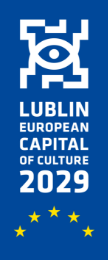
Three cities, three cultural visions
The European Capital of Culture, most of all, is the exchange of knowledge and good-quality practice, which is possible thanks to meetings and exploring different places. During our preparations for Lublin 2029, our delegation went on a study trip to Belgium. We visited three incredibly diverse cities which apply for the title of the European Capital of Culture 2030: Namur, Leuven and Molenbeek (municipality of Brussels). Each place presents a unique identity and approach towards culture – on a geographic, social, and thematic level.
Namur – a confluence of the rivers and memory of territory
The capital of the Walloon Region bases its candidacy on a metaphor of “La Confluence” – the confluence of the Sambre and Meuse rivers. During a working meeting we discussed common threads relating to nature: the memory of rivers and green networks. Namur suggests a story about joint responsibility for the future.
Leuven – the city of youth and agency
Leuven, the academic capital of Flanders, focuses on the young people’s potential. During the meetings, we were discussing initiatives which empower the students’ agency and their active role in building the participatory culture. This is an application with a clear reference to the education sector and civic participation.
Molenbeek – solidarity and unity in diversity
In a multicultural municipality of Brussels, Molenbeek, we participated in meetings with experts, advisors, and creators from Kongo, Morocco, the Netherlands, Great Britain, Palestine, and other countries. The slogan of this application is “Sadaka” –the word which means solidarity, honesty, and empathy. Molenbeek’s candidacy is a strong voice in integration and community building over divisions, in the spirit of European values. Each candidacy presents a different cultural approach to the European Capital of Culture idea; however, what connects them is an emphasis put on interpersonal relationships and an attempt to build and reinforce society in times of distress. No later than the 25th of September 2025 we are going to find out which of these cities is going to become the European Capital of Culture 2030. Not only will it be the choice of the city, but also the signal of the direction in which a European cultural policy is going – in a year, which is also going to be a symbolic Jubilee on the 200th anniversary of the independence of Belgium.
Marta Ryczkowska, PhD
ECoC Programme Manager
Tłumaczenie: Daria Nowak
Korekta: Aleksandra Górecka
